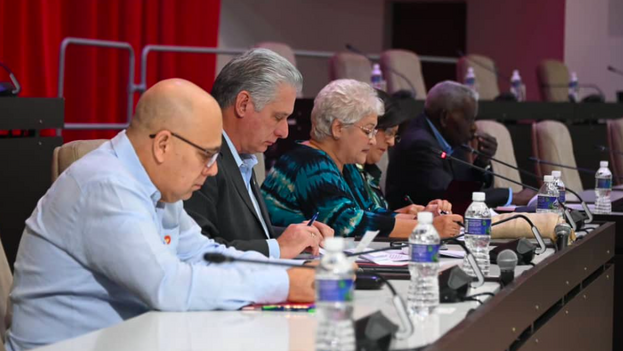
14ymedio, Havana, 20 December 2023 — Corruption in grocery stores and soup kitchens, corruption in sports and educational institutions, corruption in the state sector and in small businesses. The numbers do not add up and Cuban officials were unable to avoid the word (it had been taboo among government leaders for decades) during presentations to Cuba’s parliament, the National Assembly of People’s Power, on Tuesday.
The day’s agenda included reports on the state of domestic trade and foreign investments, on the Ministry of the Interior’s eradication of marijuana crops in the eastern provinces, on measures being taken to mitigate the educational crisis and the exodus of athletes, and a closing speech — in his usual scolding tone — by National Assembly president Esteban Lazo.
The vice-minister of Foreign Trade and Investment, Ana Teresita Gonzalez, offered the day’s most optimistic figures. She reported that some 343 businesses from forty countries were interested in investing in the island and that their applications had been approved by the government. Of those businesses, 181 are “international economic association contracts,” 106 are public-private partnerships and 56 will operate completely under foreign management.
Gonzalez indicated that, despite the fact that most of these companies are in the tourism, mining and agriculture sectors, the ministry is “dissatisfied”
Gonzalez was filling in for her boss, Ricardo Cabrisas, who has been noticeably absent during these sessions. She indicated that, despite the fact that most of these companies are in the tourism, mining and agriculture sectors, the ministry is “dissatisfied” at not being able to import all the products it wanted and had to make do with the basics: beer, soft drinks, water, flour and meat.
The other parliamentary committees did not have much to celebrate either. The battered industrial, construction and energy sectors had to acknowledge that, despite government audits, there were multiple shortcomings. These included shortages of cement, steel, electric cables, plumbing fixtures and millwork; a lack of financing and oversight; and breach of contract by some of parties involved in the process.
National Assembly delegates claimed the solution is to increase financing and provide additional subsidies to those who are economically disadvantaged provided Lazo and a group of key ministers agree to directly


